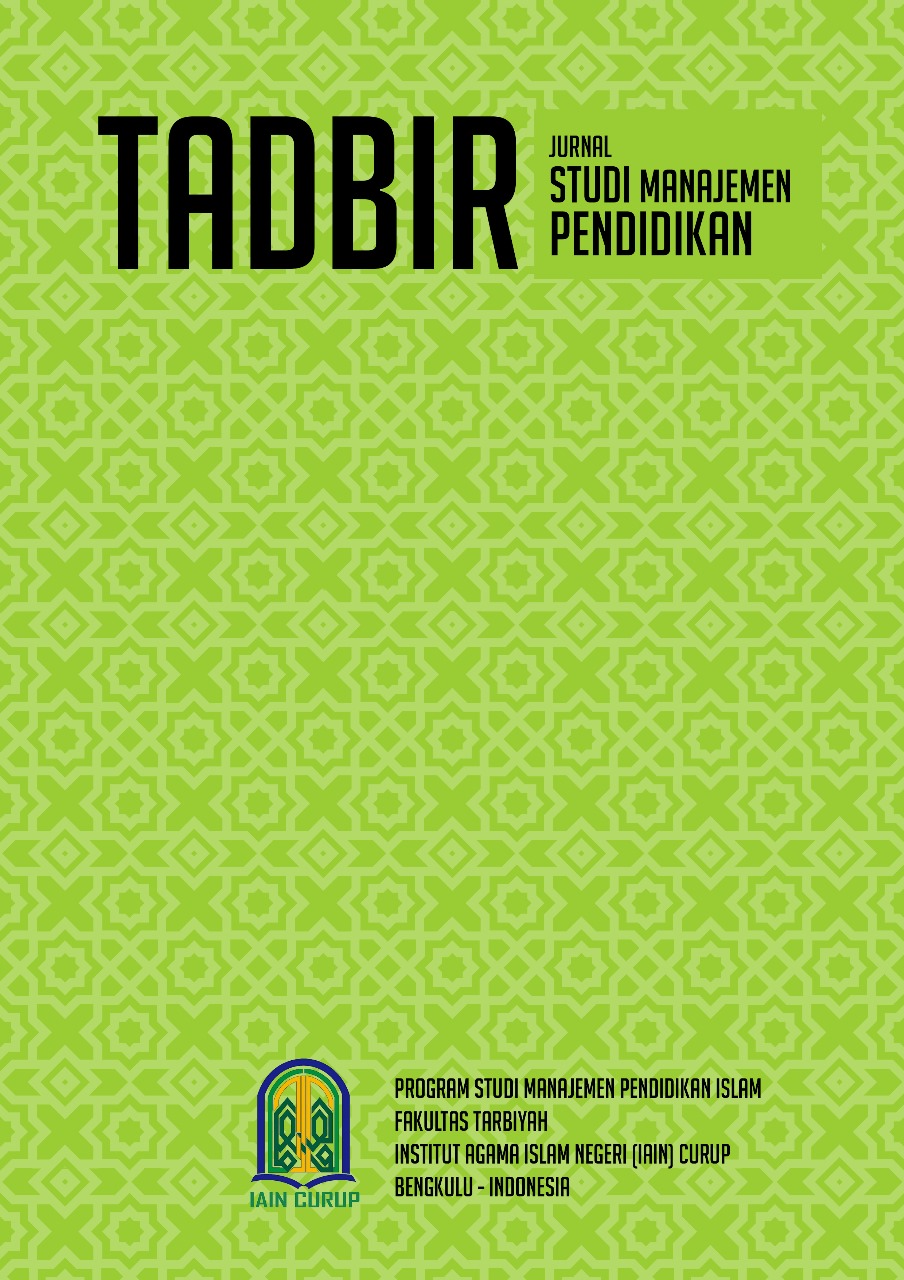Integrity and Professionalism Driven Visionary Leadership of School Principals for Enhancing School Quality
DOI:
https://doi.org/10.29240/jsmp.v8i2.11501Keywords:
Visionary leadership, Integrity, Professionalism, Educational qualityAbstract
This study aims to analyze the influence of visionary leadership based on integrity and professionalism on the quality of education in vocational high schools (SMK). The research method employed is quantitative, with data analysis techniques using Structural Equation Modeling-Partial Least Squares (SEM-PLS). The sample consists of 246 vocational school teachers selected through cluster sampling in Bireun Regency, Aceh. The results indicate that visionary leadership based on integrity and professionalism has a significant impact on the quality of education in vocational schools. The school quality variable is explained by the visionary leadership construct, which comprises the dimensions of integrity and professionalism, accounting for 82.5% of the variance. The study finds that visionary leadership grounded in integrity and professionalism has a significant positive impact on educational quality in vocational high schools, explaining 82.5% of the variation in school quality. Professionalism-based leadership was identified as having the strongest influence on school quality, followed by integrity-based leadership and general visionary leadership, all of which proved statistically significant. The implications of these findings suggest that schools should emphasize strengthening integrity and professionalism in the leadership of school principals to sustainably improve educational quality. Enhancing visionary leadership will better equip schools to face educational challenges in the era of globalization and technological disruption. This research uniquely focuses on visionary leadership in vocational education, emphasizing integrity and professionalism as critical components, unlike previous studies that often addressed general school environments without these specific leadership dimensions.
Downloads
References
Ali, N., Nawaz, A., & Iqbal, N. (2021). Leadership ethics and trust in leadership as drivers of work engagement: A moderated mediation model. Journal of Leadership & Organizational Studies, 28(2), 228-245. https://doi.org/10.1177/1548051820964167
Areagama. (2018). Integritas Kepemimpinan Kepala Sekolah Dan Budaya Organisasi Serta Pengaruhnya Terhadap Efektivitas Kerja Guru. EDUM Journal, https://doi.org/10.31943/edumjournal.v1i2.12
Ariswan, A., Rusdinal, R., Yusuf, M., & Gusril, G. (2018). The Effect of School Principals Integrity, Communication Atmosphere, Discipline and Achievement Motivation on Teachers’ Work Productivity at Public Vocational High School (SMK) in Padang. International Conferences on Educational, Social Sciences and Technology . Padang: Fakultas Ilmu Pendidikan UNP
Aydin, A., Sarier, Y., & Uysal, S. (2020). The effect of school principals' leadership styles on teachers' organizational commitment and job satisfaction: A meta-analysis study. Educational Sciences: Theory & Practice, 20(3), 60-76. https://doi.org/10.12738/jestp.2020.3.004
Azan, K., Rosadi, K. I., & Muntholib, M. (2021). Conceptual Framework and Development of Quality Management for Islamic Higher Education in Indonesia. International Journal of Social Science and Religion (IJSSR)
Bass, B. M., & Avolio, B. J. (1994). Improving Organizational Effectiveness Through Transformational Leadership. London: SAGE
Beddu, A., Suaib, D., & Jennah, M. (2016). Pengaruh kepemimpinan visioner kepala sekolah terhadap kinerja guru SMP Negeri 12 SIGI. Jurnal Katalogis, 4(7), 193-204
Begeny, C. T., Huo, Y. J., Smith, H. J., & Ryan, M. K. (2021). Being treated fairly in groups is important, but not sufficient: The role of distinctive treatment in groups, and its implications for mental health. PLoS One, 16(5): e0251871. Published online 2021 May 14. doi: 10.1371/journal.pone.0251871
Bevier, C., Regan, B., & Stevenson, C. N. (2023). Policies, Protocols, and Standards for Professionalism in a Diverse Work Environment. IGI Global
Botutuihe, S. (2020). Menjadi Kepala Sekolah Profesional Era Revolusi 4.0. Yogyakarta: ZAHIR Publishing
Cahaya, W., Suryaningsi, S., & Widyatmike Gede, M. (2021). Overcoming obstacles in implementing 2013 curriculum policy. Cypriot Journal of Education, 16(3), 967–980. https://doi.org/https://doi.org/10.18844/cjes.v16i3.5770
Damon, W., Colby, A., Bronk, K., & Ehrlich, T. (2005). Passion & mastery in balance: toward good work in the professions . MIT Press Direct, https://doi.org/10.1162/0011526054622105
Day, C., Gu, Q., & Sammons, P. (2016). The Impact of Leadership on Student Outcomes: How Successful School Leaders Use Transformational and Instructional Strategies to Make a Difference. Educational Administration Quarterly, 52(2) DOI:10.1177/0013161X15616863
Durairaj, M., Das, S., Ezhilmath, K., Aancy, H. M., Jayadeva, S. M., & Murugan, S. (2024). The Power of Visionary Leadership in Transforming the Indian Education System. In S. Chakraborty, Challenges of Globalization and Inclusivity in Academic Research (pp. 10.4018/979-8-3693-1371-8.ch011). IGI Global
Egok, A. S. (2019). Profesi Kependidikan. Semarang: Pilar Nusantara
Ekosiswoyo, R. (2016). Kepemimpinan Kepala Sekolah Yang Efektif Kunci Pencapaian Kualitas Pendidikan. Jurnal Ilmu Pendidikan, 10.17977/JIP.V14I2.24
Fatihah, N. (2024). Development of school principal professionalism, the main key to quality education. Proceeding of International Conference on Education, Society and Humanity (p. Vol. 2 No. 1). Probolinggo: Unuja
Ghamrawi, N., Shal, T., & Ghamrawi, N. A. (2023). Cultivating teacher leadership: evidence form a transformative professional development model. School Leadership & Management , https://doi.org/10.1080/13632434.2024.2328056
Ghasabeh, M. S. (2021). Transformational Leadership: Implementing a Cultural Approach in Organizations. The Journal of Values-Based Leadership , Volume 14 Issue 1 Winter/Spring 2021 Article 9
Handarini, S. N. (2019). Pengaruh kepemimpinan visioner kepala sekolah dan kinerja mengajar guru terhadap efektivitas sekolah. Jurnal Administrasi Pendidikan, 26(1), 175-183
Herawan, E. (2016). Kepemimpinan Mutu Kepala Sekolah Dalam Peningkatan Mutu Pendidikan. PEDAGOGIA, 12(2), 51-59
Hidayat, N. (2019). Deskripsi Kompetensi Guru Bahasa Arab di Madrasah Aliyah Ja-Alhaq Kota Bengkulu Berdasarkan Undang-Undang Nomor 14 Tahun 2005 Tentang Guru dan Dosen. At-Ta’lim: Media Informasi Pendidikan Islam, 18(2), 299–316
Joppe, M., Edelheim, J., Flaherty, J., Bommenel, E., Camargo, B. A., Clausen, H. B., . . . Turnšek, M. (2022). Professionalism. In J. Edelheim, M. Joppe, & J. Flaherty, Teaching Tourism (pp. 07–114, https://doi.org/10.4337/9781800374560.00019. Elgar Online.
Khalifa, M. A., Gooden, M. A., & Davis, J. E. (2022). Culturally responsive school leadership: A synthesis of the literature. Review of Educational Research, 92(2), 183-219. https://doi.org/10.3102/00346543211002091
Kouzes, J. M., & Posner, B. Z. (2017). The leadership challenge: How to make extraordinary things happen in organizations . John Wiley & Sons
Kuswardani, S. (2020). implementasi supervisi pedidikan. Semarang: Pilar Nusantara.Laporan AKuntabilitas Kinerja Instansi Pemerintah 2021. Aceh: Dinas Pendidikan Aceh
Lifornita, V., & Sholeh, M. (2021). Penerapan kepemimpinan visioner kepala sekolah pada pendidikan dasar di masa pandemi covid-19. Inspirasi Manajemen Pendidikan, 9(2), 403-416
Lorensius, Cahaya, W., Silpanus, S., & Ping, T. (2021). Leadership model and planning strategies in private Catholic colleges during the COVID -19 pandemic. . International Journal of Educational Studies in Social Sciences (IJESSS), 1(2), 49–60. https://ijesss.com/journal/article/view/16/7
Mahmud, H. (2017). Building effective school culture through visionary leadership. Proceeding of the 2nd International Conference on Education, Science and Technology (ICEST 2017), DOI: 10.2991/icest-17.2017.46
Mintowati, H. (2022). Smart Policing. NTB: Pusat Pengembangan Pendidikan dan Penelitian Indonesia
Mökander, J., Morley, J., Taddeo, M., & Floridi, L. (2021). Ethics-Based Auditing of Automated Decision-Making Systems: Nature, Scope, and Limitations. Science and Engineering Ethics , Volume 27, article number 44
Mustiningsih, M., Maisyaroh, M., & Ulfatin, N. (2020). Peran kepemimpinan visioner kepala sekolah hubungannya dengan kesiapan guru menyongsong revolusi industri 4.0. Jurnal Manajemen dan Supervisi Pendidikan, 4(2), 101-112
Naim, A. (2017). Indikator mutu sekolah menurut perspektif orang tua siswa di SMP Negeri 2 Bantul. Jurnal Kebijakan Pendidikan, 6(2), 184-193
Nanus, B. (1992). Visionary Leadership. San Francisco: John Wiley & Sons
Novita. (2017). Indikator mutu sekolah menurut perspektif orang tua siswa di SMP Negeri 2 Bantul. Jurnal Kebijakan Pendidikan, 6(2), 184-193
OECD. (2023). PISA 2022 Results (Volume I and II) - Country Notes: Indonesia. Paris: OECD Publishing
Oplatka, I., & Arar, K. (2021). Leadership for social justice and the characteristics of "good" principals: Perceptions of Israeli-Arab school principals. Educational Management Administration & Leadership, 49(5), 776-791. https://doi.org/10.1177/1741143220937329
Peer, K. S. (2020). integrity-based leadership significantly impacts the improvement of educational quality. In G. Schlabach, & K. Peer, Professional Ethics in Athletic Training (p. 22). New York: Routledge
Qingyan, G., Azar, A. S., & Ahmad, A. (2023). The Impact of Teacher Quality Management on Student Performance in the Education Sector: Literature Review. World Journal of English Language, https://doi.org/10.5430/wjel.v13n3p156
Raheja, S. (2020). Relevance of Integrity, Morality and Ethics in the Contemporary World. IARS' International Research Journal, https://doi.org/10.51611/iars.irj.v10i1.2020.107
Rahmawati, E., & Kardoyo. (2018). Pengaruh pembiayaan pendidikan, kepemimpinan kepala sekolah, peran komite dan integritas sekolah terhadap mutu lulusan melalui mutu proses. Economic Education Analysis Journal (EEAJ), 7(3), 961-975.
Sallis, E. (2002). Total Quality Management in Education. London: Kogan Page.
Soelistya, D. (2022). Kepemimpinan strategis. Sidoarjo: Nizamia Leaning Center.
Subaidi, Komariah, A., Tantowi, A., Munasir, M., Sabban, I., Hartini, N., . . . Barowi. (2023). VISIONARY LEADERSHIP IN IMPROVING THE QUALITY AND COMPETITIVENESS OF PRIVATE ISLAMIC PRIMARY SCHOOLS. Journal of Governance and Regulation, 12 (10). pp. 66-76. ISSN 2306-6784
Syafarina, L., Mulyasa, E., & Koswara, N. (2021). Strategi Manajerial Penguatan Kepala Sekolah Dalam Meningkatkan Kinerja Guru. ejounal unma, https://www.google.com/url?sa=t&source=web&rct=j&opi=89978449&url=https://ejournal.unma.ac.id/index.php/educatio/article/view/1250&ved=2ahUKEwiZ34_SmY2JAxUWwjgGHcNnGDQQFnoECBUQAQ&usg=AOvVaw2n7CZH22nlkvnseSyXB_7m
Syahrir, Danial, Yulinda, E., & Yusuf, M. (2019). Aplikasi Metode SEM-PLS dalam Pengelolaan Sumberdaya Pesisir dan Lautan. Bogor: IPB Press
Taufiqurokhman, A. K. (2017). Teori perkembangan kepemimpinan visioner dan progresif. . Jakarta: Fakultas ilmu sosial dan ilmu politik universitas Prof.Dr. Moestopo Beragama
The World Bank. (2019). The Promise of Education in Indonesia. Washington: The World Bank.
Thomas, S. (2023). Professionalism, Professional Commitment, and Performance. Advances in Accounting Behavioral Research, 269-289. https://doi.org/10.1108/S1475-148820230000026010
Ubaidillah, M., Christiana, R., & Sahrandi, A. (2019). The visionary leadershing strategy in advancing educational institutions. Erudio: Journal of Educational Innovation, 6(2), 206-215. https://doi.org/10.1855/erudio.6-2.7. .
Umalihayati, Wulandari, D., & Hardhienata, S. (2022). Peningkatan kinerja dosen melalui penguatan kepemimpinan visioner, organisasi pembelajar, kreativitas dan perilaku inovatif. Malang: Media Nusa Creative
UNESCO. (2019). Educational content up close: examining the learning dimensions of Education for Sustainable Development and Global Citizenship Education. Paris: UNESCO LIBRARY
Wibawani, D. T., Wiyono, B. B., & Benty, D. D. (2019). Kepemimpinan visioner kepala sekolah sebagai pemimpin perubahan dalam peningkatan mutu pendidikan. JAMP: Jurnal Administrasi dan Manajemen Pendidikan, 2(4), 181-187
Yang, D.-L., & Yang, N. (2024). Unveiling the path to employee performance excellence: visionary leadership behavior, vision commitment and organization resource support. Leadership & Organization Development Journal, Vol. 45 No. 7, pp. 1142-1157. https://doi.org/10.1108/LODJ-05-2023-0247
Yansyah, M., Hesti, H., Mardiana, M., & Musiman, M. (2023). Implementasi pendidikan karakter pada siswa SMP. Journal on Education, 5(4), 14653-14660
Downloads
Published
How to Cite
Issue
Section
Citation Check
License
Copyright (c) 2024 Siti Khaulah, Aan Komariah, Dedy Achmad Kurniady

This work is licensed under a Creative Commons Attribution-NonCommercial-ShareAlike 4.0 International License.













 This work is licensed under a
This work is licensed under a 